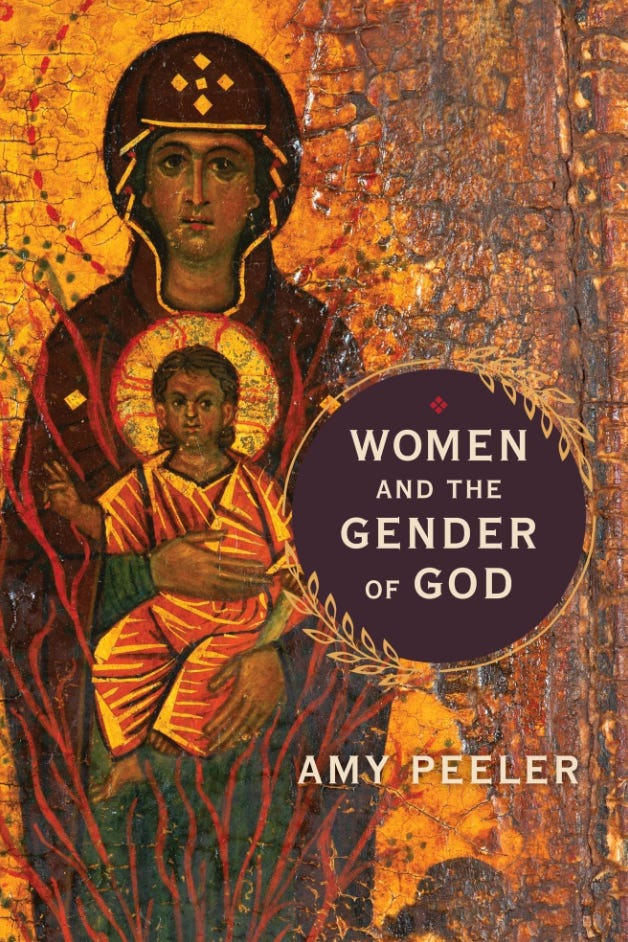Amy Peeler, in her new and important book, Women and the Gender of God, turns in the final chapter to a highlight of the book. She turns to Mary, mother of Jesus, as presented in the Gospels.
Here’s a major theme: Many perceive Mary through her body, what someone once called a divine “rent a womb.” Even more, and here I’m talking Protestant evangelicals, know what they don’t believe about Mary more than what they do believe. In that process of not-knowing they have habitually ignored the Gospel presentations of Mary, who appears third only to Jesus and Peter. In the Gospels Mary proclaims like a prophet in the power of the Spirit. So much so that she can become a paradigm of conversion and discipleship.
Amy turns to the Magnificat. What a song!
Here is my translation from The Second Testament:
Mariam’s song
46 Mariam said,
My self magnifies the Lord,
47 My spirit was over-joyed in God, my Deliverer,
48 Because he looked upon his impoverished slave.
For look! From now all generations will bless me,
49 Because the Powerful One did greatnesses for me,
His name is devoted.
50 His compassion for for generations and generations who are awed at him.
51 He made a grip with his right arm,
He scattered status-mongers in their hearts’ intelligence.
52 He took down the powerful ones from thrones
and raised the status of the impoverished.
53 He filled in the hungering ones with goods
and commissioned the rich ones away hollow.
54 He attached himself to his young servant, Yisraēl, to remember compassion,
55 Just as he spoke to our fathers, to Abra’am and to his seed to the Era.
56 Mariam remained with her about three months, and returned to her house.
I can only make some observations that riff off what Amy Peeler writes.
Her “soul” and “spirit” are enthused about what God is doing in her and will do through her, and she’s tied into what God is also doing in and through Elizabeth. It’s a family moment. Her enthusiasm is her “entire living self.”
Because God is her Savior and Israel’s Savior, and that saving act takes care of her shame. So the Savior and salvation Mary magnifies will save physically, socially, and spiritually. Mary’s redemption is holistic.
The words of this song dance and hop and skip with resonances from the Old Testament, especially from the song of Hannah in 1 Samuel 2.
Mary locates herself in the word humiliation, a term that has economic, honor, and spiritual echoes. I’m one who favors the economic because of the social dimensions of the second half of the Magnificat.
One of my favorites is when Mary says “all generations will bless me,” and of course the Protestants are known for not doing so. But her words mean the present generation and all the generations to come. Not to extol her greatness but the greatness of the God who did great things through her Son.
Where else in the New Testament do you see Mary’s words being brought into reality?
The second half (vv. 50-55) turns to corporate redemption.
The power of the Herods will be temporary; the power will shift to the power of God in this world through God’s Son.
The poor will be fed, and Mary is one who will be fed herself. The rich will not be invited to this feast – and poor stands against the rich in a hyperbolic way in the New Testament often. So the rich here are those who exploit the poor.
She proclaims and, to use Peeler’s words, she “hymns” the glories of God’s redemption. God’s power is not a zero-sum game: God can be glorified while lifting up and exalting Mary.
The Spirit comes upon Mary; Mary speaks words for the people of God. Mary is a prophet. This reveals once again that God’s Spirit empowers whom God wants to do what God wants. Women are gifted to speak the word of God, to testify, to do God’s work, to be the agents of God’s work, and to speak prophetically to the people of God. All in a woman’s body who is more than a womb. She is an agent in God’s redemptive work.
There is but one mother of the Messiah but the work of speaking for God can be replicated by others, including women.






"Many perceive Mary through her body, what someone once called a divine “rent a womb.” " Wow. This takes demeaning and devaluing women to new lows for me. Not to mention insulting God who made women in His image and created Himself in her womb!
Wow. Your translation of the Magnificat is arresting and powerful. What a gift to have the ability to translate afresh. It is wonderful that you are sharing that fresh perspective with the world!